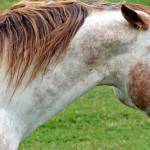Question
Weaning is always a stressful event on our farm. Both the mares and the foals seems to struggle. How do we minimize this stress?
Answer
Weaning doesn’t have to be a stressful event. The goal of weaning is to separate mare and foal with as little stress as possible as stress response at weaning can have lasting effects on both the foal and the dam.
Foals suffering from weaning stress have been shown to have decreased immune response for up to 40 hours following weaning. Weaning stress in foals can cause decreased food intake, lowered growth rate, and increased susceptibility to infectious diseases, gastric ulcers, and the risk of self-induced injury. Depending on the degree of stress and sickness, it may take foals several weeks to recover, especially if they have been injured. While most mares cope just fine with weaning, some will undergo a high level of stress when their foals are weaned.
Weaning is a key event in the breeding calendar, so ensure that you have adequately prepared for the event with some specific measures. Make sure the foal is in good health, accustomed to being handled (wearing a halter, leading, picking up feet), and eating a balanced diet. In addition to pasture and hay, foals should be fed a specially fortified creep feed from 90 days of age, building up their intake so that they are consuming about 0.5kg (1 lb) per month of age daily. Furthermore, make sure that all vaccinations and deworming treatments have been completed at least two weeks before weaning. The same goes for any corrective surgery.
Make sure that mare and foal’s surroundings following weaning are free of obstructions and protrusions that can cause injury. If at all possible, maintain the newly weaned foal in a constant and familiar environment and don’t plan any surgical or diagnostic procedures for at least two weeks after weaning.








